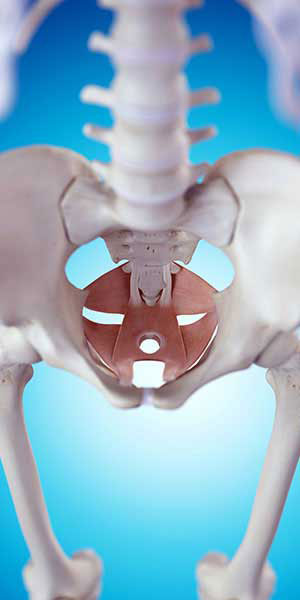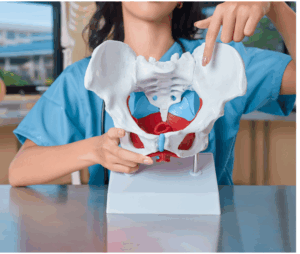Pelvic Health
Pelvic health physical therapy offers effective treatment for a wide range of issues common to women, from postpartum recovery to urinary incontinence



Have you been dealing with symptoms like bladder leaks, pain during sex, or a feeling of pressure in your pelvic area? These issues are common, but they are not something you have to live with. At Optimal Therapy, our compassionate occupational and physical therapists specialize in pelvic health therapy to help you find relief and get back to living life to the fullest.
Your pelvic floor is a group of muscles stretching from your pubic bone to your tailbone. This vital muscle group supports your internal organs, helps with bladder and bowel control, and plays a key role in sexual function. When these muscles are compromised, it can lead to Pelvic Floor Dysfunction (PFD).
At Optimal Therapy, our therapists specialize in pelvic health and work with women to treat and manage PFD. We help patients regain control and improve their quality of life.
The pelvic floor is a group of muscles that acts like a supportive hammock at the base of your pelvis. It holds up vital organs like your bladder and bowels, and in women, the uterus. These muscles play a crucial role in daily functions, including bladder control, sexual function, and stability.
Over time, certain life events—like pregnancy, childbirth, chronic coughing, or surgery—can weaken these muscles, leading to Pelvic Floor Dysfunction (PFD). PFD can cause a range of symptoms, including pain, a feeling of heaviness, urinary leakage, or urgency. The good news is that for most people, PFD is treatable with the right care.
Symptoms can include:
Pain or pressure in the lower abdomen or pelvic area.
Urinary incontinence, leakage, or urgency.
Painful intercourse.
Lower back or tailbone pain.

While many people can benefit from improved pelvic health, our specialized therapists are highly experienced in treating a wide range of conditions, including:
Urinary Incontinence & Bladder Urgency
Pelvic Pain & Painful Intercourse
Diastasis Recti (abdominal muscle separation)
Pelvic Organ Prolapse
Prenatal & Postpartum Discomfort
Post-Surgical Rehabilitation (including C-section)
Low Back & Tailbone Pain
Conditions related to Menopause
Osteoporosis
We understand that seeking help for pelvic health can feel intimidating. Our top priority is to make you feel comfortable and safe. During your first visit, your qualified pelvic health therapist will listen to your story, discuss your health history, and perform a gentle, thorough evaluation.
Based on the findings, we will create a personalized treatment plan just for you. Your program may include a combination of techniques, such as:
Pelvic floor muscle training
Manual therapy and massage
Bladder retraining
Personalized exercises
Education on posture, diet, and daily habits
You don’t have to live with pelvic pain or discomfort.
Contact us today for an evaluation and take the first step toward feeling healthy and confident again.
We use cookies to improve your experience on our site. By using our site, you consent to cookies.
Manage your cookie preferences below:
Essential cookies enable basic functions and are necessary for the proper function of the website.
These cookies are needed for adding comments on this website.
Google reCAPTCHA helps protect websites from spam and abuse by verifying user interactions through challenges.
Statistics cookies collect information anonymously. This information helps us understand how visitors use our website.
Google Analytics is a powerful tool that tracks and analyzes website traffic for informed marketing decisions.
Service URL: policies.google.com (opens in a new window)
If you want to skip the wait, you can reach our scheduling team Monday through Friday from 9am – 5pm.